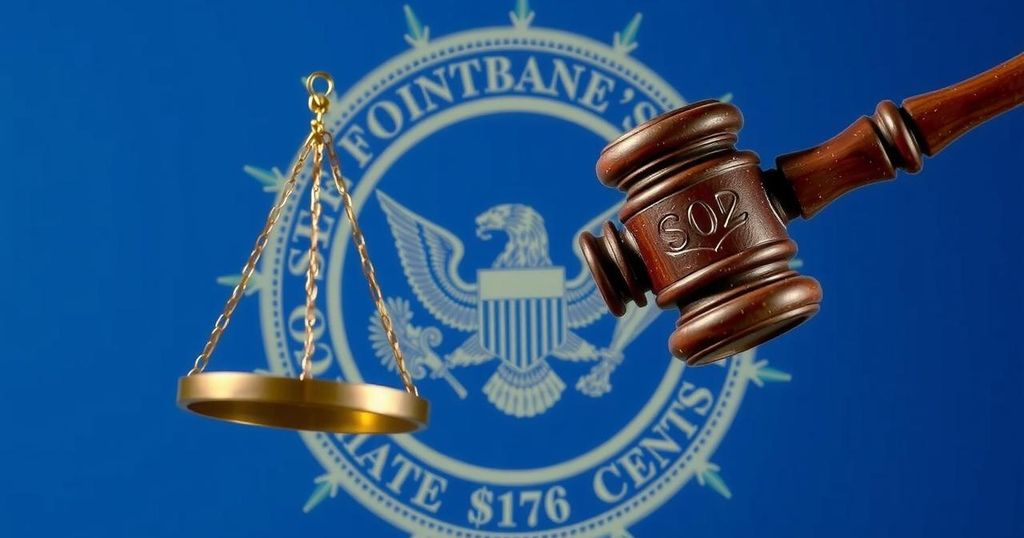SEC Achieves Key Legal Victory Against Coinbase in High-Stakes Case
The SEC triumphed in its lawsuit against Coinbase, allowing claims of unregistered securities sales to proceed to trial. This decision, made by Judge Katherine Polk Failla, led to a 2.5% drop in Coinbase’s shares after the ruling. The case highlights broader regulatory challenges in the cryptocurrency sector, especially as Coinbase remains a key player in the emergence of U.S. spot bitcoin ETFs, attracting considerable investment.
The Securities and Exchange Commission (SEC) scored a significant victory in its ongoing legal battle against the cryptocurrency exchange Coinbase. A ruling by U.S. District Judge Katherine Polk Failla determined that the SEC’s allegations of Coinbase conducting unregistered securities sales can proceed to trial, much to the dismay of the company. Following the ruling in Manhattan federal court, Coinbase’s stock dipped by 2.5%.
The SEC initiated the lawsuit in June, asserting that Coinbase operated as an unregistered broker and exchange. The agency is also seeking permanent restrictions on the company’s operations. Judge Failla underscored that although the term “crypto” may be relatively new, the underlying financial transactions fit the legal definition of securities dating back nearly eighty years. She expressed that Coinbase’s involvement in its Staking Program demonstrated unregistered sales of securities. Nevertheless, the judge dismissed claims regarding Coinbase’s Wallet application as an unregistered brokerage service.
In response to this legal challenge, Coinbase has expressed readiness to dive deeper into discussions over the SEC’s stance on cryptocurrency regulations. Paul Grewal, Coinbase’s chief legal officer, reflected this sentiment in a post on social media, looking forward to revealing insights on the SEC’s internal deliberations about crypto policy. Adding context, the SEC also indicated its ongoing lawsuit against Binance, a well-known cryptocurrency exchange facing similar accusations of unregistered transactions.
Coinbase’s influence in the crypto market has commenced a notable chapter, especially as it collaborates with U.S. spot bitcoin exchange-traded funds (ETFs), which gained SEC approval in January. These ETFs have partnered with Coinbase for custody services and have attracted a staggering $52 billion since their launch, reflecting a burgeoning acceptance of cryptocurrencies on Wall Street.
SEC Chair Gary Gensler has been vocal about the nature of trading platforms like Coinbase, emphasizing the complexities in their operations. He commented that unlike traditional exchanges, which focus solely on trading, platforms in the crypto space often blend multiple roles, questioning their regulatory status.
As the saga unfolds, Coinbase finds itself at the intersection of innovation and regulation, echoing broader questions about how digital currencies will fit into established financial frameworks. This case could set a precedent for how cryptocurrency exchanges are regulated in the future, amplifying the stakes for players in the burgeoning crypto economy and potentially reshaping the landscape of digital asset exchanges.
The SEC lawsuit against Coinbase stems from ongoing regulatory scrutiny on cryptocurrency exchanges, which have been accused of operating without proper licenses. The SEC’s actions reflect heightened concerns about market transparency and consumer protection within this rapidly evolving financial sector. The agency’s position suggests a more proactive approach to regulating digital assets, especially following the increasing institutional interest in cryptocurrencies. This court ruling, which allows for jury proceedings on the SEC’s allegations, may provide clarity on the legal treatment of cryptocurrencies and exchanges in the U.S.
The recent ruling in favor of the SEC reinforces the scrutiny that cryptocurrency exchanges like Coinbase face concerning regulatory compliance. As the legal entanglement progresses, the implications of this lawsuit could reshape the framework within which digital assets operate. The court’s decision signifies a pivotal moment for the SEC’s evolving role in cryptocurrency regulation, challenging the industry to adapt and respond to stricter oversight while navigating a landscape rich with potential and uncertainty.
Original Source: www.cnbc.com




Post Comment